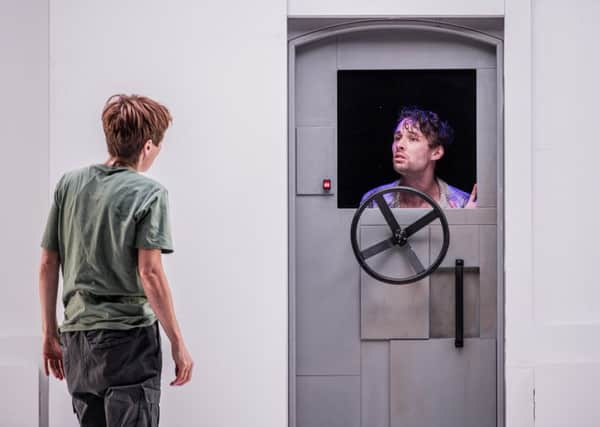Arts review of 2019: Joyce McMillan on the year in theatre


If Scotland’s theatre artists are downhearted, though, it apparently only adds a more intense creative edge to their work; for 2019 has been a year of exceptional achievement on Scotland’s stages, in terms both of the sheer quality of work produced and – given the financial pressures – of its quantity. The Lyceum in Edinburgh, for example, has some claim to be Scotland’s flagship producing theatre; and this has been a year of outstanding theatrical excellence in Grindlay Street, ranging from Touching The Void back in January – a superb stage version of Joe Simpson’s great climbing story, adapted by Lyceum boss David Greig – through a hugely popular staging of Local Hero, to this autumn’s beautiful and terrifying stage adaptation of the great science fiction story Solaris, co-produced with the Malthouse Theatre in Melbourne.
Meanwhile, the Citizens’ Theatre – still in exile at the Tramway – shared with the Lyceum in co-producing Zinnie Harris’s stunning version of The Duchess of Malfi, starring Kirsty Stuart, and also scored massive success with their spring productions of Nora – Stef Smith’s powerful take on Ibsen’s A Doll House – and of Dark Carnival, a louche and brilliant cabaret vision of life underground in a Glasgow cemetery, co-created with Vanishing Point and Biff Smith of A New International. In its 80th anniversary year, Dundee Rep struck gold with a magnificent spring production of All My Sons, directed by Jemima Levick, and – in its autumn anniversary season of Dundee plays – both with Peter Arnott’s superbly-staged vision of the 1879 Tay Bridge disaster, and with its smash-hit Christmas musical version of Oor Wullie, which is set to tour Scotland early next year.
Advertisement
Hide AdPeter Arnott’s work on Tay Bridge also produced a remarkable spin-off in the beautiful monologue The Signalman, performed and partly co-created by Tom McGovern, which was one of the outstanding successes of this year’s 500th play anniversary season at A Play, A Pie And A Pint, Scotland’s remarkable lunchtime theatre factory. Now directed by Morag Fullarton and April Chamberlain, A Play, A Pie And A Pint scored outstanding success this year with new plays including The Signalman, Uma Nada-Rajah’s terrific Toy Plastic Chicken and Rob Drummond’s The Mack, about the two catastrophic fires at Glasgow School of Art, which won Best Male Performance award for well-known television actor John Michie at this year’s Critics’ Awards For Theatre In Scotland.
2019 also emerged as an exceptional year for new plays on Scottish stages, many of them produced or premiered at the Traverse, including Stef Smith’s Fringe hit Enough, Dritan Kastrati and Nicola McCartney’s breathtaking refugee story How Not To Drown, Meghan Tyler’s Crocodile Fever, Oliver Emanuel’s autumn hit The Monstrous Heart, Douglas Maxwell’s I Can Go Anywhere, and – also in the autumn – Jenni Fagan’s stunning stage version of her own 2012 novel The Panopticon, produced by the National Theatre of Scotland. At the Tron, it was a fine year for challenging and reversing old gender stereotypes, through shows ranging from Jo Clifford’s cross-gender version of The Taming Of The Shrew to Johnny McKnight’s superb all-female panto, Cinderfella.
The year also saw the debut of Philip Howard’s new touring company Pearlfisher, with Ellie Stewart’s gorgeous surrealist stage poem Hope & Joy, and the acclaimed debut at Perth Theatre of Morna Young’s award-winning Lost At Sea, a large-scale drama about the losses suffered by Scottish fishing communities over the last two generations.
The 2019 Edinburgh International Festival brought stunning performances from James McArdle and Ann Louise Ross in Sir David Hare’s Scots-accented version of Peer Gynt, while on the Fringe, there was an exciting debut for Ross’s son Finn den Hertog and new Scottish-based company Groupwork, with their show The Afflicted.
2019 was also a year of welcomes and farewells, as Elizabeth Newman arrived as artistic director at Pitlochry, presiding in her first season over outstanding productions of Nicola McCartney’s Heritage (directed by Richard Baron), and of Brian Friel’s Faith Healer, starring George Costigan and Kirsty Stuart. In the autumn, the Traverse announced that Gareth Nicholls and Debbie Hannan had been appointed joint artistic directors, following Nicholls’s outstanding work at the Traverse as associate director, and Hannan’s superb direction both of The Panopticon, and of Marius von Mayenburg’s The Ugly One at the Tron; meanwhile, Alasdair McCrone stepped down after 24 remarkable years as artistic director of Mull Theatre, leaving behind a joyful legacy in farewell productions of Robert Dawson Scott’s The Electrifying Mr Johnston and Peter Arnott’s Unspotted Snow.
And in December, the quietly magnificent Duncan Hendry stood down as chief executive of Edinburgh’s Capital Theatres after another tremendous year which included, in the autumn alone, opportunities to see Rufus Norris’s Cabaret at the Festival Theatre, Robert Lindsay in Prism at the King’s, and Lisa Goddard and Roy Hudd in A Woman Of No Importance, also at the King’s. This Chrismtas, Hendry also presided over the joyful return of beloved comedy star Andy Gray to this year’s King’s Theatre panto, Goldilocks And The Three Bears. It’s a rowdy old show, like all the best pantomimes; but one that perhaps marks a fitting conclusion both to Hendry’s outstanding seven years in one of Scottish theatre’s toughest jobs, and – more widely – to a year which may not have been the easiest in Scottish theatre history, but has certainly been one of the richest, in celebrating theatre’s power to bring us together, even in the most divisive times.